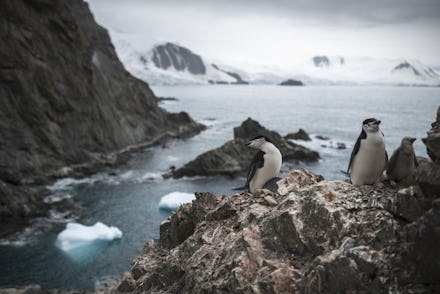Not cool: Antartica is now warm enough to be a vacation destination

Antarctica is losing its chill. A group of Brazilian scientists have been logging the continent's temperatures every three days to track any warming trends in the area. Last week, they made the news for measuring high temperatures that hit a record-breaking 65 degrees Fahrenheit. Just three days later, Antarctica broke its own record with a high of over 68 degrees Fahrenheit. It's such an abnormally reasonable temperature that you could probably vacation there to watch the penguins die from loss of habitat in person.
Scientists have, understandably, expressed both awe and concern over the numbers. Most of the warming is happening in western Antarctica — the eastern and central parts are still mostly stable — where enormous glaciers are at risk of melting down. It's already happening with the Pine Island glaciers, where a chunk of ice the size of the city of Atlanta broke off into pieces. Although this process is natural, the rate of it is anything but. Rapid melting like this can also prevent the glacier from 'healing' itself by freezing ice.
Another risk that concerns scientists is, if the temperature keeps jumping higher and higher, how much the water from the glaciers will cause the sea-level to rise. According to an estimate from NASA, later cited by CNN, the ice from the western section of Antarctica alone can raise sea-levels around the world by about four feet. That's pretty bad news for short people living on the coasts.
It's also bad news for the ecosystem that depends on a steady supply of ice. Penguins stand to suffer the most as their habitats become smaller and smaller due to the warming climate. Chinstrap penguins made the news just a few days ago over a report that counted a loss of about 56 percent of their colonies. Emperor penguins are predicted to have problems with the loss of sea ice, too.
Researchers say the melting is increasing very quickly, even during winter. And whatever happens in western Antarctica could happen in the eastern and central areas as well.
"We are seeing the warming trend in many of the sites we are monitoring, but we have never seen anything like this," said Carlos Schaefer, one of the scientists studying the impact of climate change in Antarctica, to The Guardian. It's important to continue monitoring, he added, so researchers can predict what could happen in the future.
In the meantime, when you plan your vacation in Antarctica, maybe you can take one less sweater. But you'd better plan it soon because, seriously, at this rate, it could be your last chance.